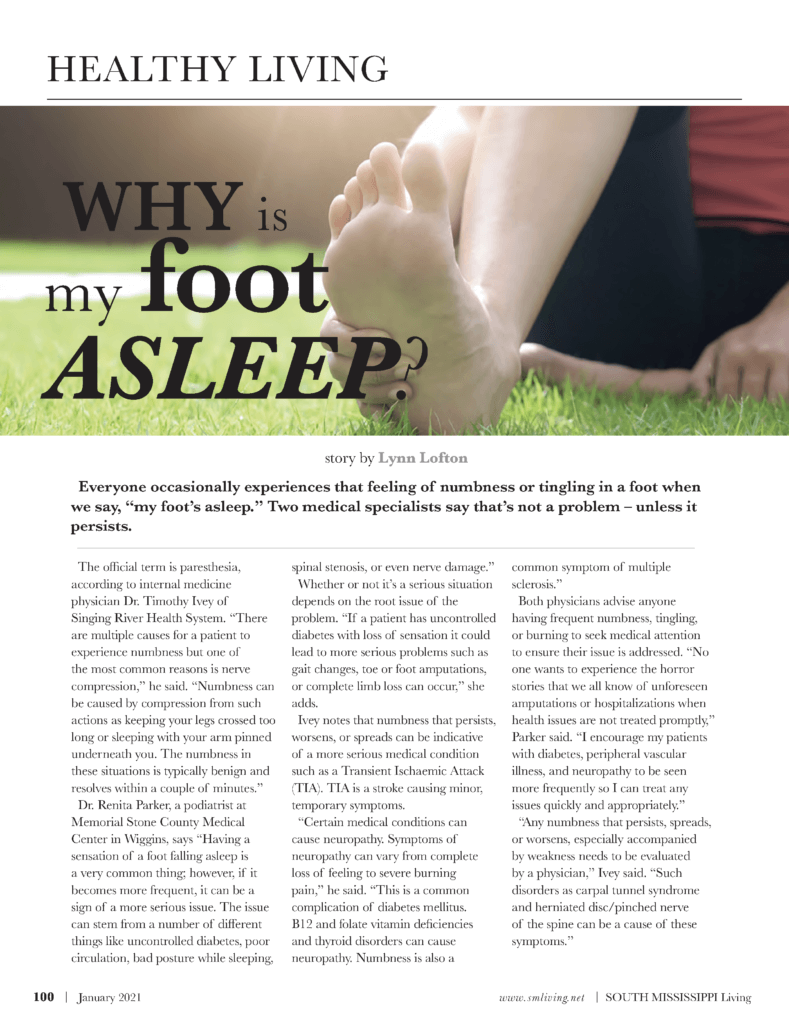Why is My Foot Asleep? Dr. Tim Ivey Explains.
Everyone occasionally experiences that feeling of numbness or tingling in their foot when we say, “my foot’s asleep.” Internal Medicine Physician, Dr. Tim Ivey, explains that’s not a problem – unless it persists.
The official term is paresthesia, according to internal medicine physician Dr. Tim Ivey of Singing River Health System’s Medical Clinic in Vancleave.
“There are multiple causes for a patient to experience numbness but one of the most common reasons is nerve compression,” he said. “Numbness can be caused by compression from such actions as keeping your legs crossed too long or sleeping with your arm pinned underneath you. The numbness in these situations is typically benign and resolves within a couple of minutes.”
Tim Ivey, MD, Singing River Medical Clinic – Vancleave
Podiatrist, Dr. Renita Parker says, “Having a sensation of a foot falling asleep is a very common thing. However, if it becomes more frequent, it can be a sign of a more serious issue. The issue can stem from several different things like uncontrolled diabetes, poor circulation, bad posture while sleeping, spinal stenosis or even nerve damage.”
Whether or not it’s a serious situation depends on the root issue of the problem. “If a patient has uncontrolled diabetes with loss of sensation, it could lead to more serious problems such as gait changes, toe or foot amputations, or complete limb loss can occur.”
Ivey notes that numbness that persists, worsens, or spreads can be indicative of a more serious medical condition such as a Transient Ischaemic Attack (TIA). TIA is a stroke-causing minor, temporary symptoms.
“Certain medical conditions can cause neuropathy. Symptoms of neuropathy can vary from complete loss of feeling to severe burning pain,” he said. “This is a common complication of diabetes mellitus. B12 and folate vitamin deficiencies and thyroid disorders can cause neuropathy. Numbness is also a common symptom of multiple sclerosis.”
Tim Ivey, MD, Singing River Medical Clinic – Vancleave
Both physicians advise anyone having frequent numbness, tingling, or burning to seek medical attention to ensure their issue is addressed. “No one wants to experience the horror stories that we all know of unforeseen amputations or hospitalizations when health issues are not treated promptly,” Parker said. “I encourage my patients with diabetes, peripheral vascular illness, and neuropathy to be seen more frequently so I can treat any issues quickly and appropriately.”
“Any numbness that persists, spreads, or worsens, especially accompanied by weakness needs to be evaluated by a physician,” Ivey said. “Such disorders as carpal tunnel syndrome and herniated disc/pinched nerve of the spine can be a cause of these symptoms.”
Tim Ivey, MD, Singing River Medical Clinic – Vancleave
Story by Lynn Lofton | South Mississippi Living Magazine January 2021
Dr. Tim Ivey’s Quick Facts on Numbness
- Paresthesia is the medical term for numbness or tingling. There are multiple causes for a patient to experience numbness but one of the most common reasons is nerve compression.
- Numbness can be caused by compression from actions like keeping your legs crossed for too long or sleeping with your arm pinned underneath you.
- The numbness in these situations is typically benign and resolves within a couple of minutes. Numbness that persists, worsens, or spreads can be indicative of a more serious medical condition such as TIA or stroke.
- Certain medical conditions can cause neuropathy.
- Symptoms of neuropathy can vary from complete loss of feeling to severe burning pain. This is a common complication of diabetes mellitus.
- B12 and folate vitamin deficiencies and thyroid disorders can cause neuropathy. Numbness is also a common symptom of multiple sclerosis.
- Such disorders as carpal tunnel syndrome and herniated disc or pinched nerve of the spine can be a cause of these symptoms. Other more serious conditions such as stroke or tumor will have to be ruled out in certain patients.
- Any numbness that persists, spreads, or worsens, especially accompanied by weakness needs to be evaluated by a physician.

